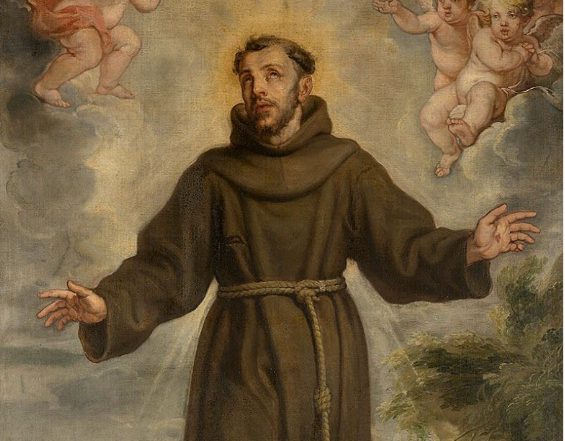Winner of the Spring 2019 StMU History Media Award for
Best Article in the Category of “People”
Francis was faced with a very large obstacle: while he was trying his hardest to pursue what he found to be his vocation, the hate that welled up in his father proved to be a major issue in his passage to that calling. Even though Francis knew without a doubt that he could easily become a very successful merchant, he felt an even stronger gravitation towards another life. Indeed, he felt called to a life that would constantly require to him to put the skills he gained from shadowing in his father’s work and provide him with an even stronger fulfillment in his life, despite it being very much against the social standards of his community and the wishes of his father. While his father saw his choice as an acceptance of failure, Francis saw it as an answer to the call of something greater than anyone could have ever imagined.
In Assisi, Italy, lived our character, Francis. Francis was born in 1182 to Pietro and Pica Bernardone. Throughout his childhood, Francis proved to be a very charming and popular young boy, as he was well liked by many children in his area, and was constantly followed by a group of friends. At home, Francis’ parents were very caring for him and constantly tended to all his wants and needs. His father was a very successful textile merchant, a career that made him and his family wealthy, while Francis’ mother stayed at home with him and did house work, including serving Francis, making him the center of her life, her pride and joy.1 Francis was well set with a large group of friends and two parents that loved to spoil him.2 When Francis was of age, he went to work with his father to learn the business of a merchant. Francis, as it turned out, was a natural, and caught on to the trade very well. After a short time, he began showing signs of a bright future as a textile merchant.
Merchants in Francis’ time were those that traveled long distances in order to exchange goods in various lands with various people. Textile merchants, the kind of merchant that Francis’ father was, tended to sell a great amount of goods and generally made very large amounts of revenue from their sales. Merchants were also well known for influencing the spread of culture and religion to those that they sold to, as they needed to be very persuasive in order to make sales, and were naturally found to do the same with their lifestyles. As a result, Francis quickly learned not only how to sell goods, but how to teach as well. The skill of spreading and teaching customs, language, and especially religion would greatly influence Francis’ future. His father had no idea that he was preparing his son for a future calling outside of textile trading.3
When Francis reached young adulthood, a war had sparked in his country, Assisi, and its neighboring city, Perugia. Francis was sent into the military to take part. On the battlefield, Francis observed firsthand the many horrors of battle, and was left with experiences that would haunt him for quite some time. Francis was not in a good mental state when he was sent home from his first tour, and sadly, he hardly had time to recover before he was sent to war a second time. The next time he came home, Francis’ behavior had taken a turn for the worst, as his memories had scarred him greatly. To attempt to rid himself of these scars, Francis tried to return to the life he had right before he first left home. In an attempt to adapt to civilian life, Francis ultimately found himself drinking heavily with his friends and was frequently surrounded by constant celebrations. In addition to his attempts to fuel his social life, he continued to live the life of good luxury in his home. All of his attempts, however, only numbed the pain for a very short time.4
Not long after returning to life in his town, Francis had fallen gravely ill. Eventually, when his state failed to improve, it seemed very likely that he would die from the illness that had caught hold of him. Francis was surrounded by distress and fear, and it seemed to him that there was nowhere to turn. With nowhere else to seek refuge, Francis began to turn towards his faith, which he had neglected through his life of luxury and celebration. He began to visit the local church daily to reflect and pray. He found a very strong devotion to Christ’s Passion, through the Stations of the Cross. This was a small conversion that would continue to influence Francis. After turning his face towards the church, Francis found himself healing from his great illness. In response, he began to devote more and more time to his spirituality within the church: he reflected daily on Christ’s Passion through the Stations of the Cross. His illness quickly forgotten, Christianity became the most important matter in Francis’ life. Unbeknownst to his community or himself, Francis was changing.5
His parents were the first to see the changes that Francis was going through, though they knew not what was going on in his life. All they noticed was that his mood, all of a sudden, had become withdrawn from others. After a while, they noticed that Francis was acting out of the ordinary, very unlike what they had always known him to be. Then, all together, without any warning, Francis simply left. Francis’ parents had no idea where he had gone or what he was up to.6
Francis had left his old life behind and began a new one. He took a vow of poverty. He no longer held a longing to have many material possessions or a large accumulation of wealth, things he was raised with. Instead, he began to focus all of his energy on teaching and preaching to others, using his skills that he had drawn from his merchant work with his father. He found that he loved to talk with his fellow brothers and sisters, and he wanted to bring them to a life dedicated to Christ. He even preached when there were no humans to preach to. Francis was known to preach to birds and other animals. He called them, too, his brothers and sisters, for he considered them to be part of God’s gifts in creation. This is the side of Francis that many Catholics would know him for as a saint, hundreds of years in the future.

Although Francis had found a path that he was truly happy to follow, his father did not share this same view. Francis’ father viewed his son’s decision as an embarrassment, since he had been raised in a place of high status. His father felt that Francis had thrown away everything that was handed to him, and tainted the family name. Soon, the frustrations of Francis’ father turned to hate and hostility, and Francis was no longer welcomed home. Despite all this, Francis continued on the path he vowed to follow.7
Despite the unfortunate circumstance with his father, Francis continued on his path of asceticism and growth of himself and others in Christ. The nature of his work ensured that Francis would travel to many areas, another lifestyle that he had grown accustomed to from his work as a merchant. Everywhere he went, he preached and began to accumulate followers. Pretty soon, Francis became a popular figurehead and was beloved by many, just as he had been as a boy. This time, however, it was by his work, not his wealth and social status, that he gained such immense popularity.
Francis saw that he had a large congregation of followers that loved his ways, so he decided to go to the Holy Father to establish a religious order after his teachings. He went with his most loyal followers and presented his request to Pope Innocent III. The order was denied at first, but after much convincing from Francis, Innocent III agreed and declared the order. Upon hearing this, Francis’ followers were overjoyed. Francis and his newly vowed religious brothers began to take on new assignments in order to guide others to Christ.8

Francis gave up everything in order to pursue his vocation in life. He abandoned the wealth and luxury that was readily available to him, and dedicated himself to a life that was so much more. Francis fought through the attitudes of his community and family alike, and stood by the life that he believed to be prosperous, going so far as to create an order that stands strong today. After his death, Francis was canonized on July 26, 1228, by Pope Gregory the IX. St. Francis is today one of the most beloved saints in the Catholic church and is often remembered for his many works and dedication to Christ and his people.9

- Paul Sabatier, The Road to Assisi (Massachusetts: Paraclete Press, 2003), 17-18. ↵
- Augustine Thompson, O.P., Francis of Assisi: A New Biography (New York: Cornell University Press, 2012), 8-9. ↵
- Paul Sabatier, The Road to Assisi (Massachusetts: Paraclete Press, 2003), 15-17. ↵
- Paul Sabatier, The Road to Assisi (Massachusetts: Paraclete Press, 2003), 19-20. ↵
- Augustine Thompson, O.P., Francis of Assisi: A New Biography (New York: Cornell University Press, 2012), 13. ↵
- Augustine Thompson, O.P., Francis of Assisi: A New Biography (New York: Cornell University Press, 2012), 14. ↵
- Paul Sabatier, The Road to Assisi (Massachusetts: Paraclete Press, 2003), 46-56. ↵
- Paul Sabatier, The Road to Assisi (Massachusetts: Paraclete Press, 2003), 64-67. ↵
- Paul Sabatier, The Road to Assisi (Massachusetts: Paraclete Press, 2003), 172. ↵



101 comments
Sofia Perez
This is a cool article about St. Francis of Assisi. My church is named after this saint and I chose him to be my confirmation saint, but I did not know much about him other than he is the patron saint of animals. He was a merchant, but later transitioned to a life of faith and following God’s will. It was sad to read that Francis was cast out of his family after he did not want to follow in his father’s footsteps, but I am glad he did not let that get the best of him.
Halie Estrada
Amazing article! I loved this story and you really brought it to life, I loved how well written it was and the amount of detail you put into it; especially about the life of Francis from luxury to trauma to his faith. I have heard of Francis of Assisi in discussions from class but it was so nice to actually dig deeper into his life and truly understand why he chose the holy spirit.
Javier Oblitas
The article was very well written! It grabbed the readers attention masterfully and kept them hooked until the very end! The attention to detail as well as the Chicago style endnotes made this article even better! I think many people should be like St. Francis and dig deep in what they believe in, despite any criticism they may receive!
Joshua Marroquin
This article is very informative about Francis’s lifestyle before and after his transition to certainty. I am very impressed on how different he acted in his early life then the life as a church going citizen. It is amazing to learn that merchants have a large impact on communities. I did enjoy reading this passage and recommend it for others to read on their spare time.
Matthew Gallardo
Hey Dalton! I’m really glad to have read this article. many Saints have untold and hidden stories when it comes to the public, and I personally had no idea that he was even a saint. I’m glad I read this article because he seems more than worthy of the title, having abandoned all his wealth to become a teacher of Christianity is extremely difficult to do, and it just shows his devotion, even continuing after his father’s disapproval. The unique way the pictures are placed, big and in the reader’s face, is a huge compliment to the article as well!
Kayla Braxton-Young
This article was very interesting and had a lot of information about something I didn’t know anything about. St. Francis’s story is one of great interest to me, as it shows how someone can have everything given to them and yet feel empty and lost. His father was a textile merchant, and Francis’s observation of his father’s trade contributed heavily to his later life and work. Francis of Assisi lived a fascinating life, taking control of his own path and inserting himself into voluntary poverty. His methods are observed and appreciated even to this day. Francis of Assisi was a great example of ikigai because he was able to apply the skills he learned from training to be a merchant to his life calling of preaching.
Jourdan Carrera
I find the story of St. Francis to be one of great interest to me. It is one of those rare examples where someone can have everything given to them and indeed be successful, but also at the same time feel empty and lost. This article does an excellent job in explaining the backstory as well as how his family got their wealth, I knew they were wealthy however I did not know that his father was a textile merchant, nor did I know that Francis’s observation of his father’s trade would contribute heavily to his later life and work.
Ian Mcewen
it is a shame that current leaders can’t live humble lives that don’t come at the expense of those under them. St Francis lived a life that could hardly anyone today could do close to, even I could say that I could not emulate what he did. it was amazing to see what he did too the spirit of the church that they didn’t need to be extravagant to do gods work.
Hailey Lechuga
The life of Francis of Assisi was fascinating to read about. Although everyone saw him headed for wealth and prosperity being that he naturally excelled as a merchant, he chose to take control of his own path according to his passions. Inserting yourself into a voluntary poverty is something I have never heard of, but it is truly admirable and he made a huge impact on his community and his methods are observed and appreciated even to this day.
Faith Chapman
This is a great article. I had heard about Francis of Assisi from one of my other Reflection classes, particularly his care for the environment, so I had heard about how he would speak to the animals as if they were his human brothers and sisters. I didn’t know that he was wealthy and that he abandoned it. I also didn’t know he used to be a merchant, but this article is a great example of ikigai that St. Mary’s tries to teach to its students because he was able to apply the skills he learned from training to be a merchant to his life calling of preaching.